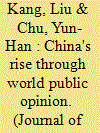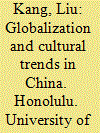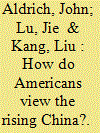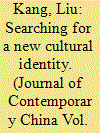|
|
|
Sort Order |
|
|
|
Items / Page
|
|
|
|
|
|
|
| Srl | Item |
| 1 |
ID:
137441


|
|
|
|
|
| Summary/Abstract |
Measuring the perception and attitudes of the world's public toward China has gained new momentum in recent years. In 2009, Shanghai Jiao Tong University's Institute of Arts and Humanities for the first time inaugurated a China-based National Image Survey Project, including a US survey (2010) and 12 Asian countries and regions (2011–2012). Authors in this special issue engage in interpretations and analysis of the data, and one of the most significant lessons is that public opinion, attitudes and perceptions of China's rise are the outcome of dynamic interactions and an assemblage of factors, a synergy of material interests, ideational and emotional reactions, and values, ideologies and principles, unraveling themselves against a highly volatile, precarious and contentious geopolitical backdrop, in which the interests of nation-states and individuals have become intertwined and inseparable.
|
|
|
|
|
|
|
|
|
|
|
|
|
|
|
|
| 2 |
ID:
051259


|
|
|
|
|
| Publication |
Honolulu, University of Hawai, 2004.
|
| Description |
xi, 208p.pbk
|
| Standard Number |
0824827597
|
|
|
|
|
|
|
|
|
|
|
|
Copies: C:1/I:0,R:0,Q:0
Circulation
| Accession# | Call# | Current Location | Status | Policy | Location |
| 048021 | 951.059/KAN 048021 | Main | On Shelf | General | |
|
|
|
|
| 3 |
ID:
137445


|
|
|
|
|
| Summary/Abstract |
The dramatic increase in China's economic and hence political power and influence is a common story around the world. Just how clearly and well does this story get across to citizens of some nations other than China, itself? In particular, we ask what Americans know about China. Do they observe its rise? Are their views simple or rich and nuanced? How do they vary across the public? What leads to more positive and what leads to more negative views of China? We report the results of a survey of the American population designed to address these questions. We find that they are reasonably knowledgeable of China's rise and that they have rich and nuanced perceptions of a variety of dimensions of China, its society, economy and polity. These views are, on balance, not especially positive, but the more cosmopolitan the citizen, the more likely they are to hold positive views. Those who are Democrats, who are liberals, and who have had the opportunity to travel in China are especially likely to have positive impressions.
|
|
|
|
|
|
|
|
|
|
|
|
|
|
|
|
| 4 |
ID:
137495


|
|
|
|
|
| Summary/Abstract |
Its newly acquired status as the world's second largest economy has entitled China to a more prominent role in global affairs, and increasingly, its behavior has drawn scrutiny from the world in ways that the country is ill-prepared for. The attention to China's rise, however, focuses not only on its economy but also on other aspects, including its military, diplomatic moves, domestic politics and its ‘soft power’, namely, its own image or self-projection and the world's perception or attitudes toward China. And yet, there has been no systematic investigation to evaluate how the world views a rising China. In this article, the authors applied the latest dataset from the Asian Barometer Survey to investigate whether East Asians recognize and welcome the rise of China. The findings suggest that geographical and cultural proximity have a great impact on people's perception of China. Countries which are territorially adjacent or culturally close to China tend to regard China as the most influential country in Asia. With the exception of Japan and Mongolia, most Asian countries hold positive views about the impact of China on the region. However, such benign evaluations are weaker in countries which have potential security conflicts with China, such as Taiwan and South Korea, when only the bilateral impact is considered. The overall picture shows that the rise of China has been largely recognized and welcomed by East Asians, despite some apprehension about China's strategic intentions to its neighboring countries.
|
|
|
|
|
|
|
|
|
|
|
|
|
|
|
|
| 5 |
ID:
114796


|
|
|
|
|
| Publication |
2012.
|
| Summary/Abstract |
The paper argues that China's global expansion and calls for its use of soft power are provoking an ideological crisis which is becoming one of the most critical challenges of the present time. Revolutionary ideology legitimated the rule of the Chinese Communist Party (CCP) for 60 years, but it has become increasingly at odds with the rapid socio-economic development that began 30 years ago. This paper examines four aspects of contemporary Chinese culture: first the discrepancy between the CCP's ideological rhetoric and its pragmatic policies; second, the fragmentation of the state, the intellectual elite, and the grassroots population in terms of cultural expressions and values; third, the consumer culture which has unleashed materialistic desires; and finally, the emergence of a 'post-80s' generation urban youth culture amidst these tension and contradictions.
|
|
|
|
|
|
|
|
|
|
|
|
|
|
|
|
|
|
|
|
|